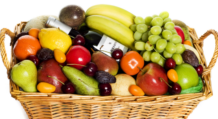Summer is a great time to gather family and friends and fire up the grill. The intense, direct heat of grilling gives food a wonderful crusty texture and flavor that we love.
“We can thank the Maillard reaction for the great grilling flavor,” says Pam Duitsman, University of Missouri Extension nutrition and health specialist. “This happens when heat, proteins and sugars in food react in a process to create hundreds of different flavor compounds. These compounds then interact to form even more nuanced flavors and aromas, giving each food distinctive flavors.”
The Maillard reaction can occur on any piece of food, not just meats, depending on the food’s protein and carbohydrate content. This is why grilled vegetables are so sweet and delicious.
“If your family doesn’t like vegetables, try them grilled,” says Duitsman. “Carrots and other root vegetables, for instance, have lots of complex carbohydrates, so they will undergo extensive caramelization when grilled.”
The Maillard reaction can develop when food is cooked at lower temperatures over a longer period, but it really kicks in above 300 degrees Fahrenheit.
“It may take meat hours to brown at 250 degrees in the oven as deeply as 15 minutes on a grill, and the mixture of flavor compounds will differ. As temperatures increase, caramelization becomes more pronounced, intensifying the flavor,” Duitsman says.
Unfortunately, at high temperatures, proteins in meat, chicken and fish can naturally form carcinogenic compounds called heterocyclic amines (HCAs) and polycyclic aromatic hydrocarbons (PAHs).
“This is especially likely if the meat is charred, which reduces the overall quality and taste of the food,” says Duitsman. “Luckily, charring can be easily avoided.”
Tips to avoid charring:
- Thaw meat before grilling so that it cooks evenly. Trim the fat and remove the skin from the meat before cooking.
- Marinating meat for at least 30 minutes before grilling has been shown to reduce the formation of HCAs.
- Cook foods near the outside of the flame rather than directly over it, and keep a spray bottle of water handy for flare-ups.
- Flip your meat frequently and use a thermometer to monitor internal temperatures of food, to avoid undercooking or overcooking and charring.
- Try pre-cooking meat partially and finish with grilling so there will be less grill time, reducing the amount of possible carcinogens.
- If meat is charred, scrape off those areas before eating.




